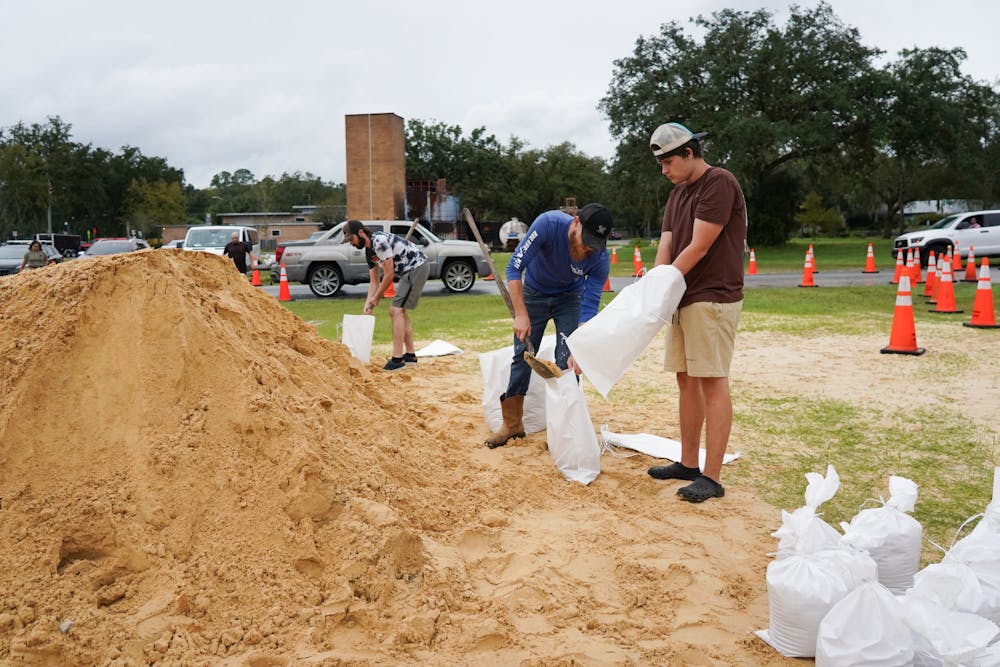When two hurricanes hit Florida in recent weeks, one community in Gainesville found itself at a loss.
Hurricane Helene and Hurricane Milton, both deadly, left widespread damage across Florida’s Gulf Coast. While Gainesville remained mostly unscathed, the eastern part of the city still struggled to receive aid and prepare for the worst.
East Gainesville, while not acknowledged as an official region, is a predominantly Black neighborhood and low-income community. In a 2017 report by the Gainesville Housing Authority, East Gainesville was identified as an area of concentrated poverty struggling with school proficiency and housing. Residents who have spent years living in East Gainesville have concerns with the community’s access to infrastructure, walkability and limited social services.
Local community weighs in
Residents in East Gainesville have been promised better housing, resource centers and added construction over the course of several decades. While some initiatives are in the works, like an affordable housing development approved by the Alachua County Commission in August, many of these promises have only been realized due to the efforts of local community members and Gainesville’s City Commission said Gerard Duncan.
Duncan, a pastor and member of the Faith-Based and Community-Based Advisory Council in the Florida Senate, has dedicated his work and faith-based services to aiding his East Gainesville community. People in East Gainesville struggle to trust information from outside messengers because of historical, systemic barriers and the disparity in equity, Duncan said.
Duncan has spent the last several years providing social services and running family resource centers for Gainesville residents, predominantly East Gainesville’s community. Through his programs and partnerships, Duncan serves about 1,000 people a month. All of his outreach programs are centered to serve eastside families, he said.
Duncan provided support to East Gainesville residents who were impacted by Hurricanes Helene and Milton.
Some residents had their roofs leaking and struggled to get tarps, Duncan said. Buckets and garbage bags were no use to collect leaking water. Though Duncan had food, water and clothes to provide to residents, he said the community acutely felt the loss of resources.
“People lost food because they was out of electricity for three or four days, so we provided food for them,” Duncan said. “The stories are numerous.”
Even after the storm, East Gainesville residents still found themselves struggling. Despite power outages, residents were facing outstanding electric bills they had to pay, Duncan said. After connecting with Alachua County Support Services and the Salvation Army, Duncan was able to give residents assistance.
For those facing homelessness during the hurricanes, several shelters took people in, like the St. Francis House, which mostly provides daily shelter for women and children.
Katelyn Drummet, the Director of Development for the St. Francis House, said the center shelters about 40 to 45 people a night. During weather emergencies, St. Francis allows for up to 60 extra guests.
St. Francis had about 15 extra guests enter for Milton and about 20 extra guests for Helene, Drummet said.
Specific data on whether the guests were East Gainesville residents was not provided.
Hurricanes and housing
George Wu, a 22-year-old East Gainesville resident, said he didn’t lose power during the storms or felt affected, but did notice a lack of resources being handed out.
But Wu is one of the few in the area with a car.
Though data on vehicle ownership in East Gainesville is not readily available, many in the area rely on public transportation to get by or lack access to a car. In 2023, a $14 million plan promising more economic developments in East Gainesville was proposed by the Gainesville Community Reinvestment Area Project, The Alligator previously reported.
But updates on the plan have seemingly gone quiet and the GCRA did not respond to The Alligator's inquiries.
“I do think there's some lack of infrastructure. There aren't crosswalks in certain areas where there should be,” Wu said.
Nyq Smith, 25, lives in East Gainesville and works in hospitality. They’ve lived in East Gainesville for four years and said the community is treated like an afterthought for development, deeming it “a massive shame.”
Walkability is a huge issue for the community, Smith said. East Gainesville struggles to have commercial grocery stories within reasonable walking distance, with just one Walmart on Waldo Road.
“Not a lot of it is very accessible. None of it is walkable,” Smith said.
After Hurricane Helene, Smith said, many in East Gainesville struggled without power. Some residents lost electricity for up to a week, they said, which wasn’t the case in more urban, predominantly white neighborhoods.
Nearly 56,000 residents, or about 40% of Gainesville, lost power during Hurricane Helene, The Alligator previously reported.
Beyond hurricane resources and preparedness, East Gainesville continues to struggle with access to resources.
In 2018, a report published by UF’s Bureau of Economic and Business Research suggested that at both “the city and regional scales,” Gainesville and its core statistical areas faced “the highest levels of geographic segregation documented in at least the last 26 years.”
According to the report, economic disparities between the west and east sides of Gainesville are still rampant.
In another investigative report conducted by Reveal, researchers found that several marginalized groups such as Black and Latinx families were being rejected for home loans at higher rates than white applicants, including in Gainesville.
“There is a shocking lack of support for that given area. I don't know if it's because it's not an attractive place to develop,” Smith said. “I don't know if it's a deliberate effort to siphon resources away from primarily people of color who live in East Gainesville.”
Contact Vivienne Serret at vserret@alligator.org. Follow her on X @vivienneserret.
Vivienne Serret is a UF journalism and criminology senior, serving as the Fall 2024 race and equity reporter for The Alligator's Enterprise desk. She previously worked as a columnist and previously reported for The Alligator's university desk as the student government reporter. She loves karaoke and lifting at the gym.






